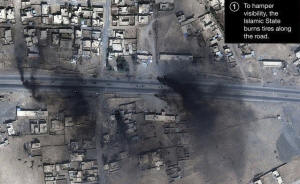|
U.S. expects Islamic State to wield
chemical weapons in Mosul fight
 Send a link to a friend
Send a link to a friend
 [October 19, 2016]
By Phil Stewart and Idrees Ali [October 19, 2016]
By Phil Stewart and Idrees Ali
WASHINGTON (Reuters) - The United States
expects Islamic State to use crude chemical weapons as it tries to repel
an Iraqi-led offensive on the city of Mosul, U.S. officials say,
although adding that the group's technical ability to develop such
weapons is highly limited.
U.S. forces have begun to regularly collect shell fragments to test for
possible chemical agents, given Islamic State's use of mustard agent in
the months before Monday's launch of the Mosul offensive, one official
said.
In a previously undisclosed incident, U.S. forces confirmed the presence
of a sulfur mustard agent on Islamic State munition fragments on Oct. 5,
a second official said. The Islamic State had targeted local forces, not
U.S. or coalition troops.
"Given ISIL's reprehensible behavior and flagrant disregard for
international standards and norms, this event is not surprising," the
second official told Reuters, speaking on condition of anonymity, and
using an acronym for Islamic State.

U.S. officials do not believe Islamic State has been successful so far
at developing chemical weapons with particularly lethal effects, meaning
that conventional weapons are still the most dangerous threat for
advancing Iraqi and Kurdish forces - and any foreign advisers who get
close enough.
Sulfur mustard agents can cause blistering on exposed skin and lungs. At
low doses, however, that would not be deadly.
Roughly 5,000 U.S. forces are in Iraq. More than 100 of them are
embedded with Iraqi and Kurdish Peshmerga forces involved with the Mosul
offensive, advising commanders and helping them ensure coalition air
power hits the right targets, officials said. Still, those forces are
not at the front lines, they added.
HUMAN SHIELDS
The fall of Mosul would signal the defeat of the ultra-hardline Sunni
jihadists in Iraq but could also lead to land grabs and sectarian
bloodletting between groups that fought one another after the 2003
overthrow of Saddam Hussein.
U.S. President Barack Obama estimated on Thursday that perhaps 1 million
civilians were still in Mosul, creating a challenge for Iraq and its
Western backers trying to expel the group through force.
[to top of second column] |

Smoke is seen in this satellite image of the city of Mosul in Iraq
on October 18, 2016. Courtesy of Stratfor.com/AllSource
Analysis/DigitalGlobe/Handout via REUTERS

"If we aren't successful in helping ordinary people as they're
fleeing from ISIL, then that makes us vulnerable to seeing ISIL
return," Obama told reporters in Washington.
The International Organization for Migration’s Iraq chief, Thomas
Weiss, said on Tuesday he expected Islamic State militants to use
Mosul residents as human shields and lent his voice to concerns
about the dangers of chemical agents.
The IOM had not managed to procure many gas masks yet, despite those
risks, Weiss said from Baghdad.
"We also fear, and there has been some evidence that ISIL might be
using chemical weapons. Children, the elderly, disabled, will be
particularly vulnerable,” Weiss said.
Attacking Iraqi forces are still 12 to 30 miles (20 to 50 km) from
the city itself and U.S. officials believe that Islamic State is
most likely to use chemical weapons later in the campaign, in what
could be a difficult, protracted battle.
The leader of Islamic State was reported to be among thousands of
hardline militants still in the city, suggesting the group would go
to great lengths to repel the coalition.
American officials believe some of Islamic State's best fighters are
in Mosul.
(Reporting by Phil Stewart and Idrees Ali; Editing by Peter Cooney)
[© 2016 Thomson Reuters. All rights
reserved.]
Copyright 2016 Reuters. All rights reserved. This material may not be published,
broadcast, rewritten or redistributed.
 |